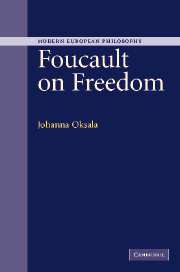2 - The Foucaultian failure of phenomenology
Published online by Cambridge University Press: 26 October 2009
Summary
Gérard Lebrun (1989/1992) suggests in an article on Foucault's archaeology that it is worth rereading The Order of Things, at least once, as an anti-Krisis. To present such a reading will be my aim in this chapter. Lebrun points out that The Order of Things and Husserl's Crisis of European Sciences bear many rhetorical, thematic and structural affinities. Both Foucault and Husserl engage in a constructive rereading of the history of philosophy, both prepare their main arguments about modern and contemporary thought with careful analyses of seventeenth-century thought, and both set as their task the elucidation of the fundamental conditions of possibility of scientific knowledge. Some of Foucault's key concepts in OT, such as ‘historical a priori’ originate from Husserl (Lebrun 1989/1992, 32). Yet despite the similarity of their tasks, themes and vocabulary, the two thinkers end up with fundamentally different understandings of the historicity of reason, the conditions of possibility of knowledge, and the development of the sciences. OT sets out to ultimately reveal the failure of phenomenology and to chart a way out the impasse.
Foucault's criticism of phenomenology in OT can be divided roughly into two different types. I will present his discussion here according to this twofold schema, although the issues in question necessarily overlap. Firstly, there is implicit criticism of the phenomenological understanding of the philosophy of science as presented in Husserl's Crisis.
- Type
- Chapter
- Information
- Foucault on Freedom , pp. 40 - 69Publisher: Cambridge University PressPrint publication year: 2005



